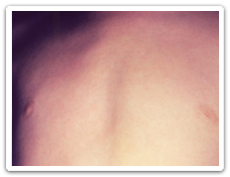Rubella (German Measles)
 Rubella is a disease caused by the rubella virus. It is also known as German measles. It is spread through respiratory droplets in the air when an infected person coughs or sneezes. One can also catch the infection by coming in close contact with an infected person. The disease can be very serious for pregnant women and their unborn babies. It can cause miscarriages or cause babies to be born with severe abnormalities such as deafness, blindness and heart or brain damage.
Rubella is a disease caused by the rubella virus. It is also known as German measles. It is spread through respiratory droplets in the air when an infected person coughs or sneezes. One can also catch the infection by coming in close contact with an infected person. The disease can be very serious for pregnant women and their unborn babies. It can cause miscarriages or cause babies to be born with severe abnormalities such as deafness, blindness and heart or brain damage.
Image Content Provider: CDC/Ann Cain
Symptoms
People infected with rubella may not show any signs or symptoms. If symptoms appear, they do so 14 to 21 days after infection. First symptoms include low-grade fever and mild, cold-like symptoms. A red or pink rash may follow. This starts on the face and spreads down to the rest of the body. Children may also experience slightly swollen glands or achy joints.
Causes
Rubella is caused by the rubella virus, which is most often spread through close contact with people who have the disease. It can also spread through respiratory droplets in the air formed when coughing or sneezing. A person can remain infectious for at least seven days after the rash appears.
An expectant mother who is infected can pass the infection to her fetus during pregnancy. This may result in a condition in the infant known as congenital rubella syndrome (CRS). Infants with CRS shed the virus in their urine and nose and throat secretions. These serve as a source of infection to their contacts.
Treatment
There is no cure for rubella. Current treatment focuses on relieving the symptoms while the disease runs its course. This usually lasts about a week.
Prevention
Rubella can be prevented through immunization. Manitoba has a provincial immunization program, which provides free, publicly-funded vaccines to those who are eligible.
Other precautions can be taken, including practicing good hand hygiene and covering your mouth when you cough or sneeze. If you are planning to get pregnant, take a simple blood test to see whether you have had rubella or the rubella vaccine. If the blood test shows that you are not protected against rubella, consult your health care provider about the risks during pregnancy and options to avoid infection.
Manitoba Health Resources
For the Public
- Measles, Mumps and Rubella (MMR) Vaccine

(August 2012) - Measles, Mumps, Rubella and Varicella (MMRV) Vaccine Fact Sheet

(December 2016) - Rubella Fact Sheet

For Health Care Providers
- Rubella and Congenital Rubella Syndrome/Infection

(November 2010) - Immunization Program Manual for Immunization Providers in Manitoba
Other Resources
Communicable Disease
Control (CDC) Health Links – Info Santé |


